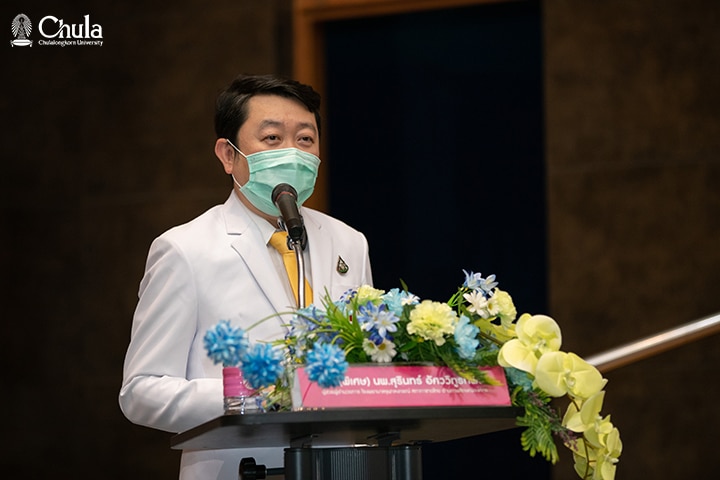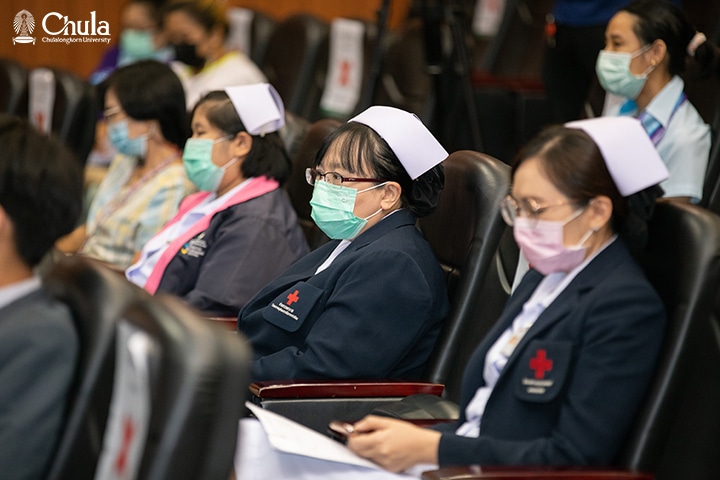Newswise — April 8, 2021 – The Division of Rheumatology, Department of Medicine, Faculty of Medicine (CU Medi), Chulalongkorn University and King Chulalongkorn Memorial Hospital, the Thai Red Cross Society (Chulalongkorn Hospital), in collaboration with the Departments of Hematology, Pulmonary and Critical Care Medicine, and Infectious diseases, held a press conference on “Thailand’s first successful treatment of systemic sclerosis patients with pulmonary fibrosis by stem cell transplantation“.
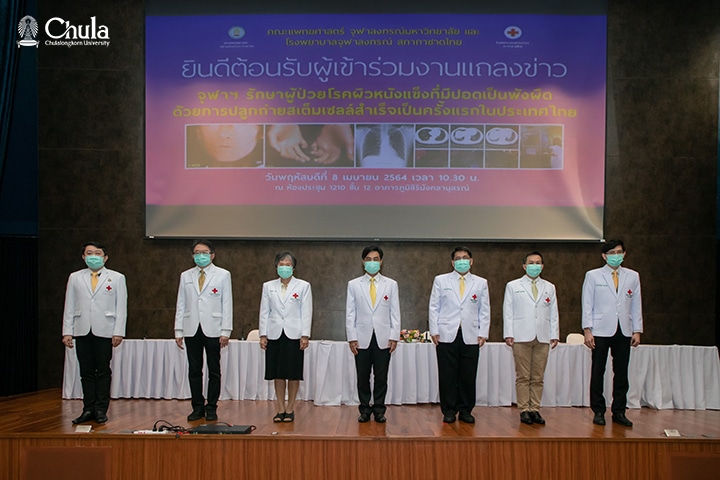
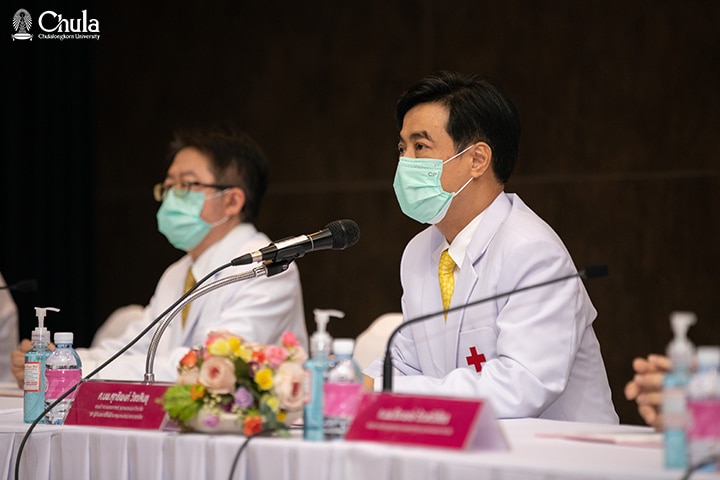
Prof. Dr. Suttipong Wacharasindhu
Prof. Dr. Suttipong Wacharasindhu, Dean of CU Medi and Director of Chulalongkorn Hospital said that both CU Medi and Chulalongkorn Hospital have been developing the services, healthcare innovation, medical equipment, and application of modern technology to patient care to ready themselves for the current and future changes in the field of medicine. They have an extensive body of research and medical innovations on stem cells. Most recently, the Rheumatology Division, in collaboration with Hematology, Pulmonary and Critical Care Medicine, and Infectious Diseases Departments were the first in Thailand to successfully treat two systemic sclerosis patients with pulmonary fibrosis by stem-cell transplantation. Such success demonstrates the expertise, specialization, and dedication of the healthcare teams in applying knowledge, research and medical technology on stem cells to help improve patients’ quality of life.
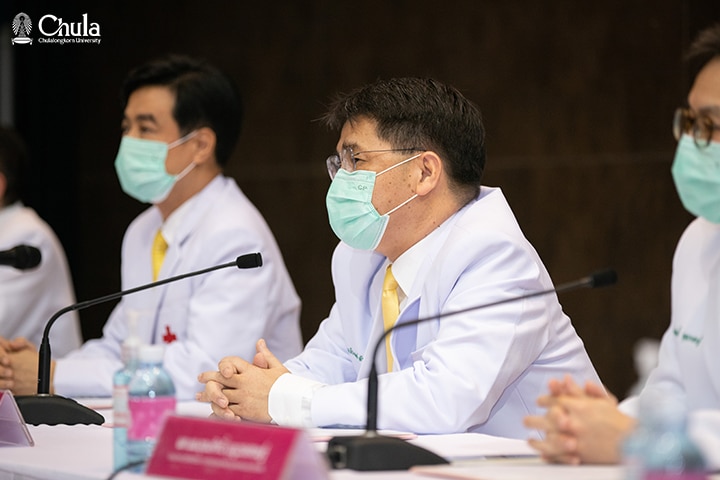
Prof. Dr. Thiraphong Tanthawichien
Prof. Dr. Thiraphong Tanthawichien, Head of the Department of Medicine, CU Medi said that the success in treating systemic sclerosis patients with pulmonary fibrosis by stem cell transplantation is a source of great pride for CU Medi. It is a modern treatment that is made possible because of the cooperation from specialists in various fields and will be optimized to benefit the whole country in the future.
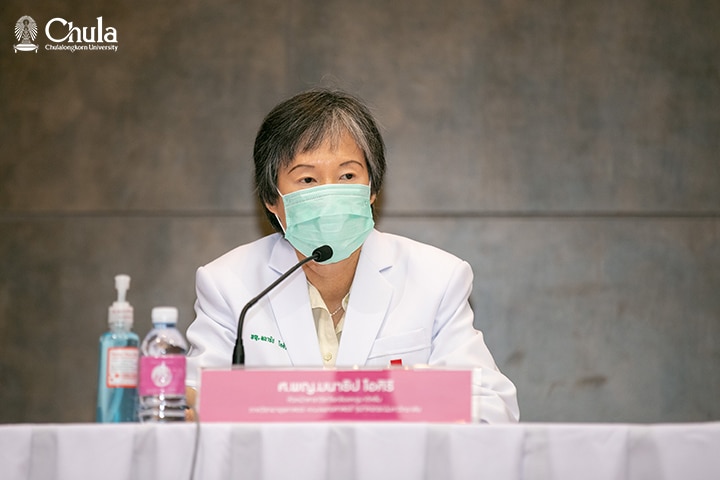
Prof. Dr. Manathip Osiri
Prof. Dr. Manathip Osiri, Head of Rheumatology, Department of Medicine, CU Medi said that systemic sclerosis is an autoimmune disease that can cause malfunctions of many internal organs. It is characterized by the formation of fibrosis on the skin and internal organs. It hardens the skin and causes fibrosis in the lungs, and cardiac muscles, and can lead to an enlarged heart and heart failure. It also causes fibrosis of the smooth muscles in the digestive tract and rendered the compression of the esophagus, stomach, small intestine, and colon ineffective or impossible. Such symptoms, when coupled with the narrowing of the arteries can limit blood supply to the fingers, and cause pulmonary hypertension, which may lead to a heart attack. Most patients suffer chronic symptoms, while some can suffer acute onsets and die.
Systemic sclerosis is not common, with about 4-35 cases per 100,000 population, and 3 times more common in females than males. The average age of people when onset occurs is 40-50 years old. Cases are found mostly in the North and the Northeast of Thailand. The causes of death for patients are usually pulmonary fibrosis, pulmonary hypertension, and heart attacks. Treatment should be started early after diagnosis to delay the progression of the disease and relieve sufferings for the patients.
Medications to treat this disease and control its progression include vasodilator drugs, immunosuppressants, used in combination with drugs that help slow down or reduce the fibrosis. However, these drugs are only effective in patients with gradual symptoms. In patients with acute and aggressive progression, treatment by regenerating the immune system to regulate its function will help slow down the disease progression, reduce damage to the organs, and prevent premature death.
Asst. Prof. Dr. Udomsak Bunworasate, Head of Hematology, CU Medi revealed that the way to effectively treat this type of autoimmune disease that causes inflammation and fibrosis in the organs is aiming to eliminate the malfunctioning immune cells and normalize the immune system. Such treatment is usually not possible with a regular dose of immunosuppressants but should be done with a high dose together with antibody treatment, followed by stem-cell transplantation created from the patients’ stem cells harvested during the treatment. The hematopoietic stem-cell transplantation will help patients recover faster, and regenerate new immune cells. In other words, this is a rearrangement of the immune system by stem-cell transplantation.
The first step is to select the right patients for the treatment. The next step is to harvest the stem cells and freeze them. During this period, the patients are kept in a sterilized room and cared for by a team of doctors and nurses specializing in caring for people with low immunity. After the stem cells start to work, patients will have their immune systems restored to normal and can be discharged from the hospital. They will then be periodically monitored, to see the progress of stem-cell transplantation.
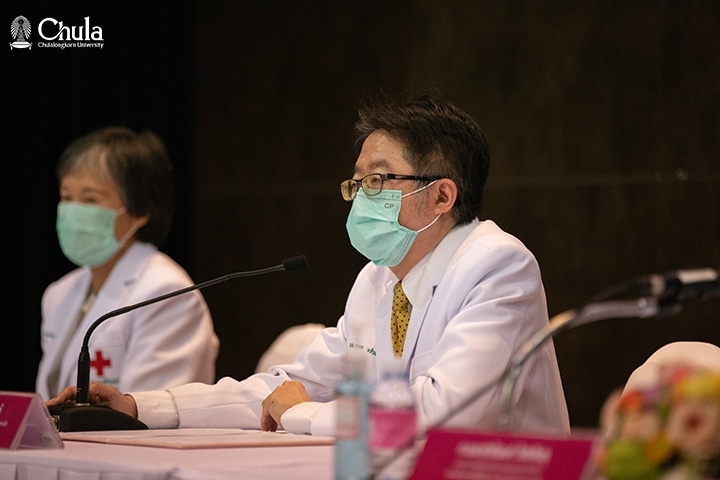
Assoc. Prof. Dr. Kamon Kaewkitinarong
Assoc. Prof. Dr. Kamon Kaewkitinarong, Head of the Pulmonary and Critical Care Medicine, CU Medi, observed that most systemic sclerosis patients with pulmonary fibrosis also suffer from noninfectious inflammation. Patients often show symptoms of dry coughs and shallow breaths which induce hyperventilation. They are easily fatigued after exertion and become less active. Disease progression differs for each patient and is unpredictable. The fibrosis may occur and stop, or keep spreading aggressively; the latter of which is found in patients with recent onsets. Some patients may also experience pulmonary hypertension, which may then cause a right ventricular cardiac arrest. During the disease progression, the pulmonary inflammation caused by the fibrosis may get worse, or trigger more complications. These conditions will further deteriorate the lungs and drastically deplete blood oxygen. Those with critically low oxygen will need a ventilator and have a high risk of losing their lives. After a thorough physical examination, doubtful cases will receive additional pulmonary CT scans that will greatly help with the diagnosis of pulmonary fibrosis. When pulmonary fibrosis is found, follow-up is very important. Periodic examinations and CT scans are done every six months, or possibly sooner if the patients’ condition worsens.
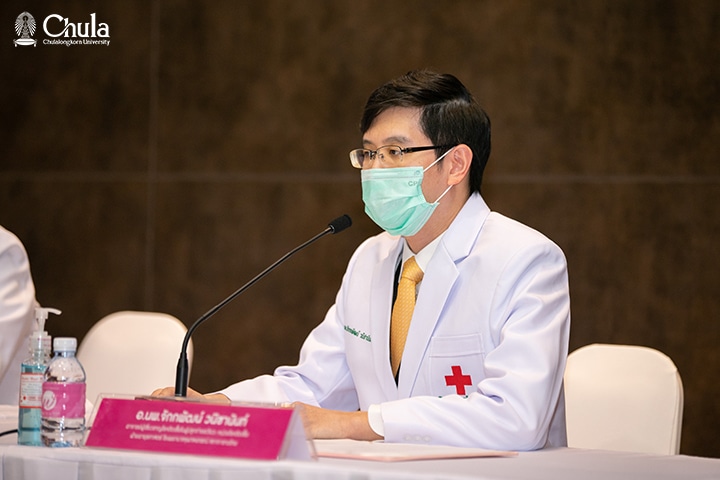
Dr. Chakkapat Vanichanan
Dr. Chakkapat Vanichanan, Lecturer and Transplant Infectious Disease Specialist, Department of Medicine, Chulalongkorn Hospital, concluded that preparing the patients by assessing the risk of infection and screening for latent infection before stem-cell transplantation, as well as prescribing antibacterial drugs are very important preventive steps to reduce the likelihood of infections. The top concern for systemic sclerosis patients with pulmonary abnormality who are candidates for stem-cell transplantation is pneumonitis which may be caused by bacteria, especially drug-resistant bacteria, or fungal infection. This will worsen the already-troubled respiratory system and can cause early respiratory failure and deterioration of the lungs in the long run. Therefore, intensive monitoring after stem-cell transplantation plus immediate prescription of antibacterial drugs once there is a sign of infection will reduce the death rate in the patients.
